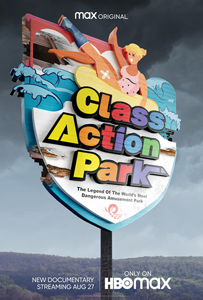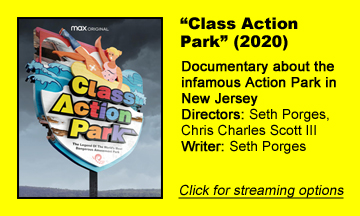“Class Action Park” (HBO Max) is a schizophrenic documentary, but unavoidably so. It chronicles New Jersey’s Action Park, a theme park of dangerous water rides, motor cars and mini motorboats that existed from 1978-96 and clearly could never exist again.
Documentarians Seth Porges and Chris Charles Scott III bounce back and forth between gleeful descriptions of the rides and much more sobering facts, ranging from park owner Eugene Mulvihill’s corruption to a teen’s death from a head injury.
Supplementing the archival material
Documentaries that look into the past without a lot of access to archival video need to rely on new animations, and luckily, “CAP” is well-suited to this format.
I think Porges and Scott must’ve used almost all the footage they could get their hands on, because they include vague images of partying employees and repeat wide shots of huge crowds and the best action of cliff diving and fast scooters multiple times.
So beneath John Hodgman’s narration or an interviewee’s description, we see cartoons playing out the words – for instance, kids coming out of the Cannonball Loop waterslide with missing teeth, which they lost at the top of the loop when gravity smashed them into the bottom surface.
It made me think of “The Simpsons,” which has skewered theme parks in several episodes – not because of the animation style, but because Action Park was a real-life cartoon.
Somewhat unfair to the interviewees – including former park guests/current actors Chris Gethard and Alison Becker – they look bad when laughing about the park when the documentary then intersperses newspaper headlines of deaths and injuries.
But Gethard does nicely sum up the conundrum wherein these are his cherished childhood memories, yet he’s also angry in retrospect that his parents allowed him to go to the dangerous park.
The question of oversight
“Class Action Park” raises the question of oversight with solid information without coming to its own conclusion. Mulvihill spent little money on safety; indeed, one anecdote reveals that he instructed lifeguards to not be present along the Colorado River Ride because the real rapids wouldn’t have a lifeguard. Also, most of his employees were under-qualified teens.
At the same time, the New Jersey government was corrupt or easily influenced by Mulvihill and did little to protect the citizenry from its own stupidity of going to this park. Even the local newspaper was under Mulvihill’s sway, reporting the deaths and injuries but not digging too deep.
One solid reporter, Jessi Paladini, was fired by her editor at the instruction of Mulvihill – a horrific breach of internal journalistic ethics. So one can be an advocate of government oversight or not, but either way, it wasn’t going to work in the Garden State in the 1980s.
While “Class Action Park” paints an excellent picture of what it was like to be an employee or guest, it stays safely between the bumpers. There are very few accounts of people simply having fun when a ride worked as intended, and coming away uninjured.

Chronicling a tragedy
And it only chronicles one death in detail, that of 19-year-old George Larsson Jr. in 1980. When the mother speaks of her late son and the accident, we are essentially chastised for smiling at other parts of the film, and we should be. Six people died at Action Park, where an injury tally of 50-100 was normal in its heyday. (It’s a testament to “CAP’s” foreboding tone that I thought “Oh, only six people died” upon looking up the stats.)
I might’ve liked a comparison with safer water parks. Action Park reopened from 2014-16 in a much more safety-conscious climate, so it would’ve been nice to get footage of those safer rides to contrast with the original park’s chaos.
A certain frustration underlies “Class Action Park,” because we see Action Park could still be an awesome place if money was spent on safety instead of paying off politicians — and sometimes, guests who won lawsuits. (Despite the cheeky name, no class-action suits were filed against the park.)
It was a place of extremes in a time of free-range children; now, society has gone too far in the other direction, and something has been lost to the sands of time. Still, a sober viewer can’t help but think “good riddance” to Action Park after this chronicle.


